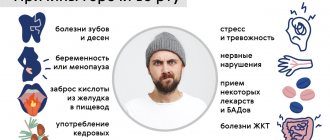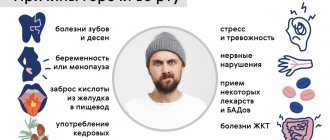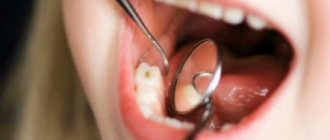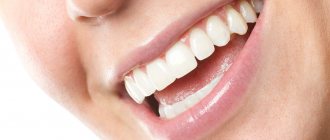Many people feel the taste of bitterness in the mouth, especially in older age, when various chronic diseases are acquired. The main causes of bitterness in the mouth after eating include diseases of the gastrointestinal tract, oral cavity, liver and gall bladder.
In rare cases, a bitter taste is a side effect of various medications or eating any foods, for example, fatty, fried, processed foods. These sensations are temporary and disappear after their cause is eliminated. The constant bitter taste sensation must be taken seriously.
Causes
Bitterness in the mouth after eating is a rather unpleasant symptom.
Depending on the circumstances and with what frequency bitterness in the mouth occurs, the etiology of this symptom can be assumed:
- Every morning you feel bitterness - this is a symptom of liver failure or gallbladder disease.
- After physical activity - liver disease.
- After eating - diseases of the stomach, intestines and gall bladder.
- When eating fatty or fried foods, diseases of the gallbladder, liver and bile ducts occur.
- Constant causeless bitterness is a symptom of cholecystitis, cholelithiasis, endocrine or psychological disorders, as well as cancer of the stomach, esophagus or intestines.
- Rare and quickly passing sensations of bitterness are the consequences of taking medications or stress.
How to restore the liver after coronavirus?
The liver is a unique organ that is able to recover on its own in a short time even after a serious load caused by coronavirus infection. One thing is required from a person - not to disturb her.
That is, if the patient continues to eat poorly, drink alcohol, and smoke, the liver receives the same toxic substances from the intestines and lungs, which do not allow it to return to normal. Therefore, it is important to adhere to the doctor’s recommendations, otherwise the treatment will not only take many years, but will also be absolutely useless.
The functioning of the liver is based on the performance of the microbiota inhabiting the intestines. And the state of microflora directly depends on the food that a person eats.
Considering that the body is not adapted to foods containing many additives and substitutes, the liver has to work under increased load. We should not forget that the coordinated functioning of the liver is ensured by exclusively high-quality products consumed in the correct proportions. That is, overeating is also one of the causes of pathologies of this organ.
It's all about the bile
How does bitterness in the mouth occur after eating? Thanks to the functioning of the liver, fats are broken down into food components that are easily digested. In this case, bile is released into the duct and emulsifies fats into particles. In cases of pathological processes, bile stagnates in the canal and is released into the esophagus. Bile also accumulates in the gallbladder. Due to this, a bitter taste appears in the mouth.
The cause of bile stagnation can be various diseases of the gastrointestinal tract, including inflammatory and infectious ones. In this case, bile enters the gastrointestinal canal in an amount that is not enough for the complete processing of all food.
Also, in this case, intestinal motility disorders occur, and as a result, stagnation of the digestive process. Undigested food is retained in the intestines, and rotting processes begin - this causes changes in taste sensations and the appearance of a bitter taste. A bitter taste in the mouth after eating food can be a symptom of the following diseases:
- Cholecystitis
- Jaundice
- Pancreatitis
- Colitis
- Gastroesophageal reflux disease
- Dyskenesia
Cholecystitis
Cholecystitis is an inflammation of the gallbladder. This disease is accompanied by bitterness in the mouth, heartburn, pain in the right side, and dry mouth. During the acute form of the disease, the temperature rises and vomiting, stool disturbances and the formation of a white coating on the tongue are possible.
Gastroesophageal reflux disease
Bitterness in the mouth after eating as an alarm signal
During this disease, there is an active release of gastric juice into the esophagus, sometimes so intensely that it reaches the esophagus and mouth. Therefore, it is not surprising to feel bitterness after eating. Such emissions usually occur due to overeating, abuse of fatty and fried or spicy foods.
Does COVID-19 therapy affect the liver?
In addition to the toxic waste products of the coronavirus, the liver is also subject to serious stress during treatment of the infection. The drugs used to treat COVID-19 have a fairly strong hepatotoxic effect.
In addition, some patients have various chronic diseases, for example, tuberculosis or neoplasms, which significantly aggravate the situation. In this regard, doctors, when developing a treatment plan for coronavirus disease, focus on mandatory hepatoprotective therapy if the patient has signs of liver damage.
The European Societies for Infectious Diseases and the Study of the Liver also adhere to this position and recommend that patients with signs of liver damage from COVID-19 continue treatment under the close supervision of doctors. During therapy, hepatoprotectors and essential phospholipids are used, which will restore the parenchyma and reduce the clinical manifestations of the pathology.
Other reasons
A bitter taste in the mouth can also be felt for reasons not related to diseases of the gastrointestinal tract. These reasons include:
- Hormonal disorders
- Gingivitis
- Periodontitis
- Diabetes
- Taste disorders
- Oral diseases
Inflammatory diseases of the oral cavity, untreated caries and pulpitis, periodontitis and gingivitis can often be accompanied by bitterness after eating. This is due to the processes of decay in the mouth, inside the tooth or gum. During inflammation, many pathogenic microorganisms appear in the oral cavity; as a result of their reproduction and the spread of their waste products, bad breath and bitterness appear.
Taste disorders
With this disease, disruptions in the functioning of taste buds located in the palate and tongue occur. Many people suffering from this disease feel bitterness all the time. Elderly people, whose number of taste buds are significantly reduced, are susceptible to this disease.
Hormonal disorders
Diseases of the endocrine system are accompanied by hormonal disorders. If they are associated with a malfunction of the thyroid gland, an increased amount of secretion is released. As a result, adrenaline is released. This hormone can provoke muscle spasms of the biliary tract, after which dyskinesia occurs and, as a result, bitterness in the mouth.
Pregnancy
During pregnancy, heartburn and a bitter taste in the mouth occur quite often. The reason for this is the increased growth of the uterus and its pressure on neighboring organs, including the stomach and gall bladder.
Side effect after taking medication
Many antibiotics, antihistamines and antifungals increase the load on the liver. Therefore, after taking them, quite often a feeling of bitterness and other unpleasant symptoms occur in the mouth. Even many phytomedicines, for example, St. John's wort and boron uterus, have an effect on the functioning of the liver. After stopping taking these medications, the unpleasant symptom disappears without a trace.
Causes of bitter taste in mouth
Poor quality food
When eating poorly prepared, burnt foods, a specific taste of bitterness appears in the mouth. The unpleasant sensation decreases after drinking water, but the residual aftertaste can last up to 30-40 minutes. A bitter taste on the mucous membranes of the mouth occurs when eating nuts and seeds, which contain fatty acids that break down to form bitter chemical compounds. The symptom is not accompanied by pain or dyspeptic disorders.
Age-related changes
In older people, gradual atrophy of the mucous membrane occurs, as a result of which the ability to distinguish tastes is lost. Therefore, during a meal, the bitter taste is most pronounced, and the remaining taste qualities of the food are not perceived. The elderly complain of bitterness felt in the mouth regardless of the type of food, associated with a decrease in saliva production and activation of pathogenic microflora.
Smoking
Nicotine and various harmful tars that make up cigarettes linger on the mucous membrane of the mouth and cause a bitter taste. Chewing gum or sucking on mints can help reduce the discomfort. Smokers also note a decrease in the ability to perceive the taste of food. If you feel a metallic taste in your mouth against the background of constant bitterness, you should immediately consult a doctor.
Pregnancy
The periodic development of a bitter taste in the mouth during gestation is caused by natural causes. Due to the increased production of the hormone progesterone, the flow of bile into the intestinal lumen is disrupted, bile acids are thrown into the overlying sections of the gastrointestinal tract and cause discomfort. A bitter taste in the first half of pregnancy can occur with severe toxicosis; the irritating taste intensifies after an attack of vomiting.
The symptom sometimes occurs in pathological conditions that are provoked by pregnancy. The most common etiological factor is cholestasis of pregnancy. Bitterness in the mouth begins to bother a woman from the 32nd week of gestation. The irritating bitter taste is accompanied by severe skin itching, lightening of the stool and darkening of the urine. If such signs appear, you should contact an antenatal clinic.
Functional dyspepsia
Periodic disturbances in the coordinated functioning of the gastrointestinal tract are recorded in more than 80% of adults. The bitter taste is caused by slow digestion of food and weakened intestinal motility. An unpleasant feeling often occurs immediately after eating against the background of heaviness in the stomach and flatulence. The feeling of bitterness can be relieved by drinking water with lemon juice or mint candies.
The clinical picture of dyspepsia is more typical for young, emotionally labile patients. Schoolchildren and students often experience a bitter taste in the mouth and abdominal cramps during exams. The symptoms are short-lived, in most cases the condition returns to normal within 1-2 days after the stress factor disappears. If bitterness is accompanied by severe unbearable pain and diarrhea, consultation with a specialist is necessary.
Hepatitis
Liver damage has various causes, but the manifestations of all clinical variants are similar. A bitter taste in the mouth as an initial symptom of hepatitis is more often observed with chronic inflammation of the liver parenchyma. An unpleasant sensation develops half an hour to an hour after eating, but can also appear in the morning. If a patient with liver inflammation falls asleep during the day, he wakes up and feels a sharp, irritating taste in his mouth.
In patients with chronic viral hepatitis B and C, bitterness on the oral mucosa persists for 2-3 months, and in the case of fibrotic degeneration of the liver, it becomes a permanent symptom. Toxic hepatitis is characterized by short-term uncomfortable taste sensations that disappear after intensive therapy. The bitter taste is aggravated by pain and heaviness in the right hypochondrium, nausea, vomiting mixed with bile.
Biliary system damage
Disturbances in the functioning of the biliary organs cause erratic, uncontrolled secretion of bile, which is associated with the appearance of a feeling of bitterness. With mild severity of the disease, a bitter taste is provoked only by the abuse of fatty and fried foods and alcoholic beverages. The symptom is accompanied by nausea, dull pain in the right hypochondrium, and increased frequency of bowel movements. The condition improves after a few days of a gentle diet.
With severe inflammatory or destructive changes in the biliary system, a bitter taste constantly bothers a person. In the morning, severe bitterness and nausea are felt due to the flow of bile into the stomach and esophagus. The appearance of white or grayish feces is typical, and sometimes painful skin itching occurs. The main reasons for the development of a bitter sensation in the mouth:
- Functional disorders
: hyperkinetic dyskinesia, hypotonic insufficiency of the sphincter of Oddi. - Inflammatory causes
: cholecystitis, cholangitis, cholecystocholangitis. - Cholelithiasis
. - Parasitic infestations
: opisthorchiasis, echinococcosis, giardiasis.
Pathologies of the gastrointestinal tract
Almost all disorders of the digestive tract are accompanied by an unpleasant taste in the mouth, since they provoke disturbances in the digestion of food and the secretion of bile into the duodenum. With chronic gastritis and duodenitis, a person periodically experiences bitterness in the oral cavity against the background of errors in diet and nervous strain. Bitter taste is more often associated with food intake.
Pancreatitis and other pathological causes of the pancreas are manifested by a change in taste perception. There is an unpleasant bitter taste, which is often combined with a rotten odor from the mouth. With exacerbation of pancreatitis, the feeling of bitterness intensifies, nausea is noted, and vomiting with impurities of undigested food and bile is possible. Patients also notice a grayish or yellow coating on the tongue.
Dental diseases
The impact of a bacterial cause on the oral cavity causes the development of purulent stomatitis and ulcers, which are accompanied by the appearance of bitterness in the mouth. The symptom is a constant concern; the intensity of the unpleasant taste sensation does not depend on food intake. A specific bitter taste combined with bad breath is characteristic of deep caries.
A bitter taste is observed after medical manipulations in the mouth. When choosing a low-quality material for fillings, it gradually begins to react with salivary enzymes and is destroyed, causing an unpleasant taste. Such symptoms usually occur in the initial period after the installation of dentures. Bitterness is associated with the presence of a foreign object in the mouth. If the symptom is accompanied by toothache, you need to visit a doctor.
Neurological disorders
The symptom occurs when the taste nuclei of the brain are damaged. Patients complain of a bitter taste in the mouth, which appears for no apparent reason and does not disappear after brushing their teeth. The clinical picture is characterized by a perversion of taste: sweet is perceived as sour or salty and vice versa. Bitterness on the oral mucosa occurs after a stroke or traumatic brain injury. In older people, the symptom is often caused by Alzheimer's disease.
Complications of pharmacotherapy
Most often, a bitter taste develops during antibiotic treatment. These drugs suppress beneficial microflora and disrupt the activity of salivary lysozyme, as a result of which fungal microorganisms are activated. Patients note a constant bitterness and burning sensation in the mouth, which intensifies while eating. The symptom is also provoked by other medicinal causes: taking chemotherapy drugs, antihistamines, cholekinetics.
Rare causes
- Diseases of the respiratory system
: alveolitis, pneumonia, purulent bronchitis. - Endocrine diseases
: hypothyroidism, hypocortisolism, diabetes mellitus. - Tumors
: hepatocellular carcinoma, stomach cancer, pancreatic head cancer. - Unloading
and
dietary therapy
.
What to do?
Bitterness in the mouth after eating can be eliminated in various ways.
So, there are quite a few causes of bitterness in the mouth and it is impossible to determine the exact etiology from just one or a few symptoms. In order to get rid of this unpleasant feeling, you need to undergo a full examination, including:
- Ultrasound
- Gastroscopy
- Colonoscopy
- Laboratory diagnostics
- Computed tomography
- MRI
Choosing the right research and treatment is impossible without consulting a gastroenterologist, therapist, or neurologist.
Treatment methods
Basically, the treatment of bitterness in the mouth comes down to taking medications. The specialist selects complex therapy based on the results of tests and instrumental examinations. The gastroenterologist identifies one of three problems:
- Liver disorders. Means are prescribed to stabilize the operation of the “filter”,
- Digestive tract dysfunction. Drugs that affect the digestive system normalize the work
- Uncontrolled bile production. Eliminated by drugs that affect the level of secretion, for example, anticholinergics.
How to reduce bitterness in your mouth
You can get rid of the feeling of bitterness in your mouth only after treating the disease of which it is a symptom. To alleviate the condition, you need to reconsider your diet: do not eat fried, fatty, salty and smoked foods, switch to foods of plant origin. You should avoid stress, take soothing herbal infusions, and exercise.
A feeling of bitterness may occur due to the formation of toxins in the body. Therefore, it is necessary to treat the intestines. Cleansing enemas and taking enterosorbents will help, which not only cleanse the body of toxins, but also relieve constipation and ensure regular bowel movements. To cleanse the body, you need to drink plenty of clean water every day.
Foods that may cause a bitter taste in your mouth
A good place to start is to take stock of what you've recently eaten. Some foods cause a bitter aftertaste:
- Pine nuts;
- Fatty meats;
- Strong coffee or tea;
- St. John's wort decoction;
- Pasta;
- Sea buckthorn oil;
- Alcohol.
Typically, a bitter taste occurs immediately after eating or after several hours. Bitterness in the mouth can also be caused by taking certain medications - antibiotics, antiallergic drugs, blood pressure medications, and others.
What to do
- It is necessary to avoid “bitter” foods or not eat them before bed.
- Diversify the menu with fruits, especially citrus fruits.
- Add buckwheat porridge to the list of dishes.
- If the bitterness is caused by taking pills, it disappears a few days after the end of treatment.
Folk remedies
Bitterness in the mouth may be due to medication
In cases where no serious pathologies are found, folk recipes will help get rid of the feeling of bitterness in the mouth.
- Flax seed. To prepare the drink, take a quarter cup of ground flaxseed, add half a liter of boiled water and leave. Drink half a glass in the morning.
- Vegetable juices. Freshly squeezed juices from potatoes, carrots and celery increase the secretion of saliva and thereby help with bitterness in the mouth.
- Decoction of calendula flowers. For half a liter of boiling water you need to take 20 grams of calendula flowers, bring to a boil and leave. It is recommended to take 2 glasses per day for a month.
- Sunflower oil. Keep the slightly heated oil in your mouth for several minutes. The feeling of bitterness should disappear.
- Corn silk. A decoction of corn silk has choleretic properties, it contains fiber, B vitamins, and vitamin E. It helps cleanse the body, get rid of bad breath and stimulate the production of digestive enzymes.
- Rose hip decoction. Rosehip decoction is a choleretic agent and a real vitamin bomb. This drink not only relieves the feeling of bitterness in the mouth after eating, it also stimulates the immune system.
The choice of treatment for bitterness in the mouth depends on the disease that caused this sensation. No matter how harmless this symptom may seem, the cause of its occurrence can be quite serious, so you should not neglect this signal from the body and listen to it: get examined and begin treatment.









